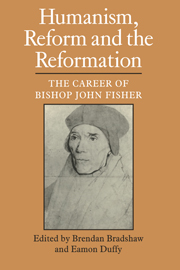Book contents
- Frontmatter
- Contents
- Preface
- List of abbreviations
- Bishop John Fisher, 1469–1535: the man and his work
- John Fisher and the promotion of learning
- The University chancellor
- The bishop in his diocese
- Fisher and Erasmus
- Fisher and More: a note
- The polemical theologian
- Fisher's view of the Church
- Fisher, Henry VIII and the Reformation crisis
- Royal ecclesiastical supremacy
- The spirituality of John Fisher
- Appendixes
- Index
Fisher's view of the Church
Published online by Cambridge University Press: 04 August 2010
- Frontmatter
- Contents
- Preface
- List of abbreviations
- Bishop John Fisher, 1469–1535: the man and his work
- John Fisher and the promotion of learning
- The University chancellor
- The bishop in his diocese
- Fisher and Erasmus
- Fisher and More: a note
- The polemical theologian
- Fisher's view of the Church
- Fisher, Henry VIII and the Reformation crisis
- Royal ecclesiastical supremacy
- The spirituality of John Fisher
- Appendixes
- Index
Summary
It could be argued that John Fisher's treatise Assertionis Lutheranae Confutatio, published in Antwerp in January 1523, is one of the most distinguished pieces of theological writing to come from England in the sixteenth century. Certainly, few works were greeted with such acclaim in the author's lifetime and few continued to exercise the influence this treatise did in subsequent decades. The Confutatio was reprinted in Paris in the same year, 1523, then subsequently in Cologne, Venice, Augsburg and Louvain. Twenty editions of the book were published between 1523 and 1564. It also went into translation: the greater part of Article 15 was translated into German by Cochlaeus and published as early as 1523. Further articles were published subsequently and the entire book appeared in German in Dresden in 1525 and Leipzig in 1526. Throughout the rest of the century Fisher's Confutatio was a recognised resource for Catholic apologists in their controversial writings and speeches. One evident reason for this was the framework of the book, which corresponded quite directly with both the content of the papal Bull excommunicating Luther as well as with one of Luther's earliest replies to this detailed condemnation. Hence the Confutatio provided a convenient compendium of Catholic theology relating directly to the main points of divergence, according to Rome, between Martin Luther and Roman Catholic orthodoxy. However, it was not merely the framework which appealed. The thoroughness with which Fisher dealt with the issues involved, most notably, of course, his treatment of the Roman primacy in Article 25 and those which followed, drew the plaudits of contemporary Catholic apologists.
- Type
- Chapter
- Information
- Humanism, Reform and the ReformationThe Career of Bishop John Fisher, pp. 131 - 154Publisher: Cambridge University PressPrint publication year: 1989

